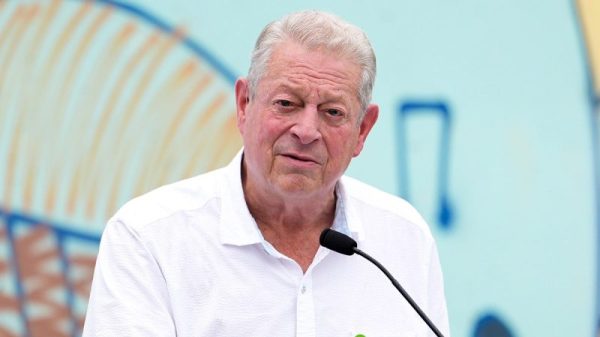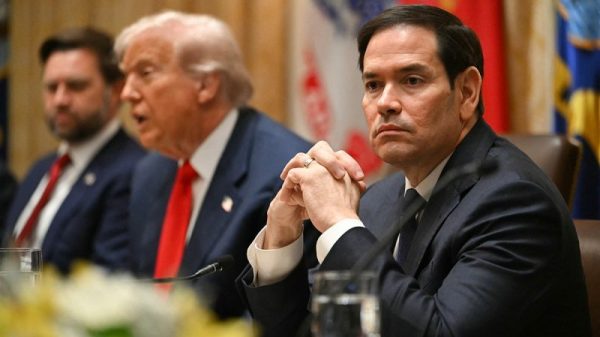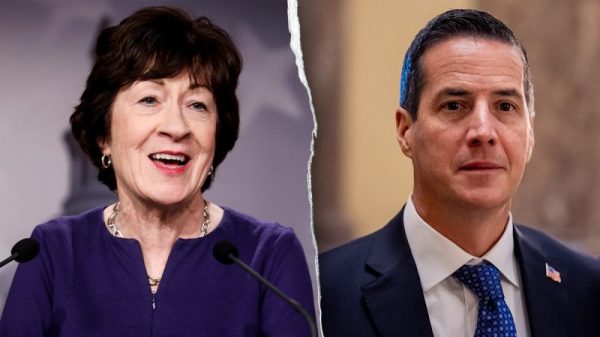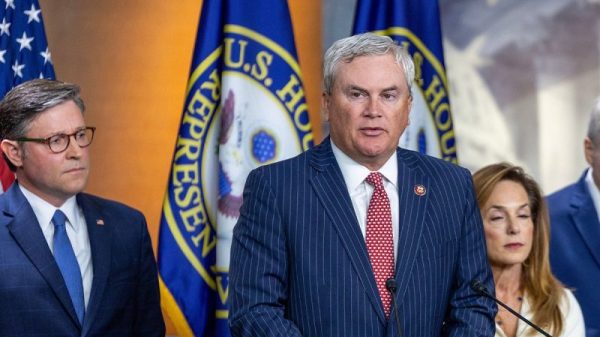President Biden on Friday confirmed his support for a bill advancing through Congress that could result in a nationwide ban on the social media app TikTok.
“If they pass it, I’ll sign it,” he told reporters at Joint Base Andrews in Maryland’s Prince George’s County.
Biden’s words may provide a push for a bill that has gathered momentum quickly in Congress but still faces hurdles to passage. On Thursday, a House committee advanced the bill on a unanimous bipartisan vote, 50-0, after TikTok users flooded congressional offices with calls protesting the measure.
The bill is the latest threat to the app, which has been downloaded 170 million times in the United States despite critics’ concerns about data security and its Chinese connections. The bill would not directly ban TikTok but would force its Chinese parent company, ByteDance, to sell the app or face restrictions that could bar it from U.S. app stores.
While the bill could be on track for a floor vote in the House, where it has gained the support of Speaker Mike Johnson (R-La.), the Senate has yet to introduce companion legislation. It would need to pass both chambers before reaching Biden’s desk. Previous White House statements have been more tentative about support for the effort.
But while Biden voiced support for the bill, Donald Trump, his Republican rival who’d pushed for a TikTok ban while in office, said Thursday night that he no longer thinks it’s a good idea.
“If you get rid of TikTok, Facebook and Zuckerschmuck will double their business,” he said in a post on his platform, Truth Social, referring to Meta CEO Mark Zuckerberg. He called Facebook “a true enemy of the people” but didn’t explain his reasoning.
Opponents of the bill, including civil liberties groups, have said it would impinge on the freedom of expression of TikTok’s millions of American users and would violate the Constitution. Last year, a federal judge blocked Montana’s attempt to ban the app statewide, saying it was unconstitutional for a variety of reasons.
Sen. Rand Paul (R-Ky.) blocked a similar bill last year, citing its impact on free expression. “We should beware of those who use fear to coax Americans to relinquish our liberties,” Paul said at the time.
Sen. Mark R. Warner (D-Va.) said Friday that he still harbors concerns about “the constitutionality of an approach that names specific companies” but will be “taking a close look” at the bill.
“I’ve said all along that I’m willing to work with anyone — Republican or Democrat — who takes this threat seriously,” Warner said in a statement.
TikTok did not immediately respond to a request for comment Friday. In a statement following Thursday’s committee vote, TikTok spokesman Alex Haurek said, ‘This legislation has a predetermined outcome: a total ban of TikTok in the United States. The government is attempting to strip 170 million Americans of their Constitutional right to free expression. This will damage millions of businesses, deny artists an audience, and destroy the livelihoods of countless creators across the country.”
Ellen Nakashima contributed to this report.
President Biden on Friday confirmed his support for a bill advancing through Congress that could result in a nationwide ban on the social media app TikTok.
“If they pass it, I’ll sign it,” he told reporters at Joint Base Andrews in Maryland’s Prince George’s County.
Biden’s words may provide a push for a bill that has gathered momentum quickly in Congress but still faces hurdles to passage. On Thursday, a House committee advanced the bill on a unanimous bipartisan vote, 50-0, after TikTok users flooded congressional offices with calls protesting the measure.
The bill is the latest threat to the app, which has been downloaded 170 million times in the United States despite critics’ concerns about data security and its Chinese connections. The bill would not directly ban TikTok but would force its Chinese parent company, ByteDance, to sell the app or face restrictions that could bar it from U.S. app stores.
While the bill could be on track for a floor vote in the House, where it has gained the support of Speaker Mike Johnson (R-La.), the Senate has yet to introduce companion legislation. It would need to pass both chambers before reaching Biden’s desk. Previous White House statements have been more tentative about support for the effort.
But while Biden voiced support for the bill, Donald Trump, his Republican rival who’d pushed for a TikTok ban while in office, said Thursday night that he no longer thinks it’s a good idea.
“If you get rid of TikTok, Facebook and Zuckerschmuck will double their business,” he said in a post on his platform, Truth Social, referring to Meta CEO Mark Zuckerberg. He called Facebook “a true enemy of the people” but didn’t explain his reasoning.
Opponents of the bill, including civil liberties groups, have said it would impinge on the freedom of expression of TikTok’s millions of American users and would violate the Constitution. Last year, a federal judge blocked Montana’s attempt to ban the app statewide, saying it was unconstitutional for a variety of reasons.
Sen. Rand Paul (R-Ky.) blocked a similar bill last year, citing its impact on free expression. “We should beware of those who use fear to coax Americans to relinquish our liberties,” Paul said at the time.
Sen. Mark R. Warner (D-Va.) said Friday that he still harbors concerns about “the constitutionality of an approach that names specific companies” but will be “taking a close look” at the bill.
“I’ve said all along that I’m willing to work with anyone — Republican or Democrat — who takes this threat seriously,” Warner said in a statement.
TikTok did not immediately respond to a request for comment Friday. In a statement following Thursday’s committee vote, TikTok spokesman Alex Haurek said, ‘This legislation has a predetermined outcome: a total ban of TikTok in the United States. The government is attempting to strip 170 million Americans of their Constitutional right to free expression. This will damage millions of businesses, deny artists an audience, and destroy the livelihoods of countless creators across the country.”
Ellen Nakashima contributed to this report.





















